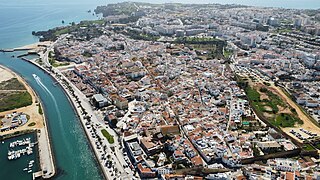Lagos, situated in the southern region of Portugal’s Algarve, offers a unique blend of historical richness and coastal allure. Known for its fortified walls, stunning cliffs, and sandy beaches like Meia Praia, Lagos appeals to history lovers and beach goers alike. Its charming old town is crisscrossed with cobbled streets leading to ancient churches, cozy cafes, and vibrant markets, where the scent of grilled sardines fills the air.
Visit during spring or early autumn to enjoy mild weather, fewer crowds, and lower prices, enhancing your experience of Lagos’ cultural and natural beauty.
Explore Lagos by foot or rent a bike to navigate its picturesque streets and nearby trails, offering a deeper connection to this enchanting Portuguese city.
Top things to do & see in Lagos
Select the following sights and activities to discover best tickets and tours available in Lagos.
Lagos: A Gem on the Algarve Coast
| Country | Portugal |
| Time in Lagos | GMT+0 |
| Language spoken | Portuguese |
| Population | 31,049 (Data from Statistics Portugal, 2021) |
| Currency | Euro (€, EUR) |
| Airports |
|
Lagos, located in the Western Algarve region of Portugal, combines historical charm with seaside splendor. Originally a maritime town due to its strategic harbor, Lagos has a history that dates back over 2000 years to the Carthaginians. It played a significant role during the Age of Discoveries, serving as a base for naval explorations in the 15th and 16th centuries, which is evident in its richly decorated churches and old fortresses. Today, Lagos is renowned for its vibrant cultural scene, stunning cliffs, and some of the most beautiful beaches in the world, such as Praia Dona Ana and Meia Praia. Its charming historic center, with cobblestone streets and picturesque plazas, offers an array of restaurants, bars, and shops that contribute to its lively atmosphere.
Where is Lagos?
Lagos is situated along the southern coast of Portugal, in the famed Algarve region, known for its dramatic coastline and historical towns.
Distances:
| Route | Distance by car | Time by car |
|---|---|---|
| Lisbon to Lagos | 183 miles (295 km) | Approx. 2 hours 50 minutes |
| Porto to Lagos | 354 miles (570 km) | Approx. 5 hours 30 minutes |
What is Lagos famous for?
Lagos is famous for its historical significance, stunning coastlines, and as a former center of maritime explorations during Portugal’s Age of Discoveries. Its beaches, cliffs, and vibrant nightlife also make it a popular destination.
History
Prehistoric to Roman Era
Early settlers were attracted to the area of Lagos due to its rich marine resources and favorable climate. Evidence suggests that the region was inhabited by Neolithic tribes who were later succeeded by the Celts. The Romans recognized Lagos’s strategic importance, incorporating it into their province of Lusitania. Significant ruins, including mosaics and bathhouses, highlight the prosperity during the Roman era.
711-1249: Moorish Rule and Reconquista
Following the collapse of Roman authority, the Moors conquered the Iberian Peninsula, including Lagos in the 8th century. The town was known as Zawaia. However, throughout the Middle Ages, it was a frequent target of the Reconquista efforts. In 1249, the town was finally captured by the forces of King Afonso III of Portugal, marking a significant turning point in its history.
15th-16th Century: Age of Discoveries
Lagos rose to prominence during Portugal’s Age of Discoveries, with Infante Dom Henrique (Henry the Navigator) using the town as a base for exploration. The construction of shipyards, and the influx of maritime traffic, turned Lagos into one of the most important cities on the Iberian Peninsula during this period.
17th-20th Century: Military and Economic Shifts
The 1755 earthquake devastated Lagos, leading to a long period of economic stagnation. The town saw some revitalization during the 19th century as it served as the hub for the Algarve’s cork industry and later, canned fish production.
21st Century: Tourism and Modern Development
In recent decades, Lagos has transformed into a vibrant tourist destination, known for its historical sites, vibrant cultural scene, and stunning beaches. Modern developments have respected the town’s rich history while providing amenities for international and domestic visitors.
Visit Lagos
What to see and do in Lagos, Portugal
Explore the rich heritage and scenic beauty of Lagos. Visit the historic Forte da Ponta da Bandeira and the ancient walls that protected the city for centuries. Don’t miss the stunning Praia Dona Ana beach, known for its spectacular cliffs and crystal-clear waters. Engage with history at the Museu Municipal Dr. José Formosinho, which showcases local archaeology, religion, and art.
- Take a boat tour to see the awe-inspiring caves of Ponta da Piedade.
- Stroll through the charming streets of the Old Town, filled with vibrant marketplaces and quaint cafes.
- Enjoy water sports like surfing and kayaking in the Atlantic’s inviting waters.
Festivals in Lagos
Lagos is host to numerous festivals throughout the year. The Lagos Food Fest, held in July, celebrates local and international cuisine. In September, the town comes alive with the Festa de São Gonçalo, commemorating its patron saint with a blend of religious processions and lively street fairs.
Best time to visit Lagos
For ideal weather and vibrant local events, visit Lagos between June and September. The summer months bring sunny days perfect for beach activities and outdoor dining, while the ocean remains pleasantly warm.
Is Lagos worth visiting?
Lagos is indeed worth visiting, offering a unique blend of historical richness, stunning natural landscapes, and vibrant cultural experiences. Whether you’re interested in exploring ancient history, relaxing on beautiful beaches, or enjoying lively festivals, Lagos provides an enriching and enjoyable experience that caters to a wide range of interests.









